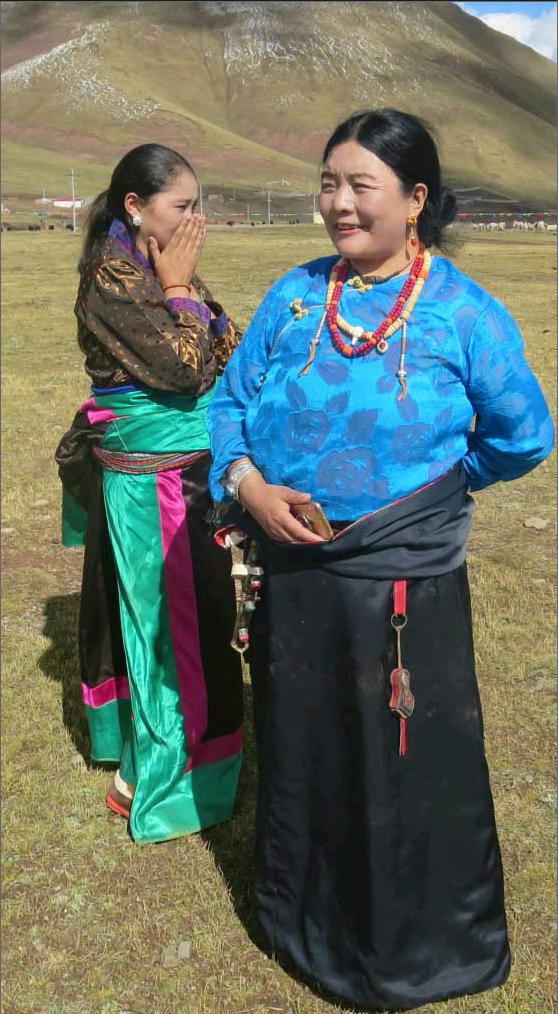Modern Herdsmen
By+Ge+Lijun

ZHAXI Gobo, a 38-year-old herdsman from Qumarleb County in Yushu Tibetan Autonomous Prefecture, Qinghai Province, has two incomes. He used to be a fulltime proud herdsman like his forefathers, but now works as a truck driver in the county. Whats his secret? By joining a herdsmens cooperative, many local Tibetans like Zhaxi Gobo can keep herding traditions alive while finding work outside their village to increase their income.
“In the past, we used to practice nomadic herding, and that means we had to be on the move all year round. We depended on the weather and there was no guarantee of income. The money I made was hardly enough to feed my family of five,” he told ChinAfrica.
The situation has greatly improved since early 2013, when Zhaxi Gobo joined the Zangdi Ecological Herdsmens Cooperative. There, all his goats and yaks are taken care of by designated persons in a centralized manner. After joining, he could have time to learn to drive and later started working as a truck driver.
“Now I have two income sources: one from the cooperative, and the other from working as a driver. I can earn up to 50,000 yuan ($7,500) every year,” he said proudly.
Three years ago, Zhaxi Gobo, like many of the countys residents, lived a nomadic life. On average, each household had about five people and kept 10 to 20 yaks and some goats. They could earn no more than 2,000 yuan ($300) a year.
To improve local herdsmens livelihoods, the county government established the Zangdi Ecological Herdsmens Cooperative in 2013.
“The cooperative not only frees herdsmen, but also makes good use of the grassland. Ecology protection and poverty alleviation work hand in hand,” said Nyima Zhaxi, Head of Qumarleb County.
Pooling in resources
After the cooperative was established, local herdsmen can pool in grassland, livestock, expertise, vehicles and equipment, and share the economic benefits of professional management.
As herdsmen have grassland use rights according to the contracts they signed with the local government in the 1980s, the cooperative gives each household a subsidy of 2,000 yuan ($300) a year for using the grassland in rotation. This not only protects the ecological system on the grassland, but also increases herdsmens income.
“Each one of the families has signed a contract with us. During the contract period, their livestock is managed by the cooperative, while herdsmen receive a yearly income. At the end of the contract, the cooperative will return the same number of livestock that herdsmen entrusted at the beginning of the contract,” Cering Doje, Secretary of the cooperative, told ChinAfrica.
Currently, 35 families have joined the cooperative, headed by Zhagyai. He and 10 other families are in charge of managing all the livestock, and in exchange receive an annual payment of about 35,000 yuan($5,224).
The cooperative has achieved impressive growth. Starting with just 500 goats and 500 yaks three years ago, it now has 2,288 goats and 1,760 yaks, according to Zhagyai.
Besides, the cooperative plays a major role in protecting grasslands in the ecologically important Qumarleb County, which is located in west Qinghai Province, at the source of the Yellow River and the Yangtze River, the two most important rivers in China. The cooperative practices rotational grazing, so as to ease the burden pastoral farming imposes on the local ecology.
Less risks and more benefits
A key factor in the cooperatives success lies in the mode of reducing risks and sharing benefits. For example, the county government promises it will compensate the loss of the herding households whenever their livestock die due to a natural disaster.
In the adjacent Zhidoi County, the Tanggar Ecological Herdsmens Cooperative has put in place a more market-oriented compensation mechanism. The coop-erative has purchased a livestock insurance policy to manage risk.
“A premium of 2.7 yuan ($0.4) is paid for each goat and 18 yuan ($2.7) for a yak, but the compensation can be up to 300 yuan ($45) and 2,000 yuan($300) respectively, when losses are incurred from an unexpected natural disaster,” said Ngacering, Head of Zhiqu Township in Zhidoi, adding that a total of 276 families in Tanggar Village have joined the cooperative.
The cooperatives decision-making and management process is open and democratic, which is another reason for its success.
“We operate in accordance with the Law on Specialized Farmers Cooperatives. Each member has his/her own rights and obligations. They actively participate in regular meetings, because their own interests are involved,” said Cering Doje from Zangdi Cooperative. Herdsmen elect the cooperatives board of supervisors and council members, according to the secretary. “This whole process is regulated by law, and the herdsmen have the chance to voice their opinions,” he said.
Skills development
In the past, no matter how many yaks and goats each family had, they needed to milk and herd them by themselves. After cooperatives were established, young people had the opportunity to learn new skills and find ways to increase the family income.“At first, we just wanted to try ‘bunched-up herding, but later we found that through integration, the cooperative can free many young people and they can go out and get better jobs,” said Zhagyai. To better alleviate poverty in a targeted approach, the Qumarleb Government set up a skills development service center, offering training in various job skills for herdsmen, such as Tibetan jewelry making, hairdressing and even wedding hosting. For example, Kangduo Nuoze Tibetan Arts & Crafts Co. Ltd. in Qumarleb County hired 10 of the best local jewelry makers to teach 60 students jewelry-making techniques free of charge. After one or two years, trained apprentices are expected to earn an average monthly income of 3,000 yuan ($450).
Addressing challenges
“Our cooperative now focuses on market-oriented operations, and facilities and infrastructure should also be constructed to support its development,” said Nyima Cering, Deputy Head of Zhidoi County.“For instance, we plan to set up a livestock products processing factory, in which we will be able to produce beef and mutton products. We will build our own brand based on local ethnic characteristics and develop our economy in a sustainable manner,”he said. Yet, the biggest difficulty still facing the cooperative is how to improve its infrastructure, including electricity and road networks. Due to the high altitude(approximately 4,200 meters above sea level) and harsh climatic conditions, the cost of infrastructure construction and maintenance is particularly high. It was only last November that Zhidoi County was connected to the electricity network and many villages in the county still do not have access to electricity.“We have found our own way to alleviate poverty which is suitable for our region,” said Nyima Zhaxi.“The cooperative model helps us reduce poverty and increase herdsmens income, without damaging the grassland ecological environment,” he said.

